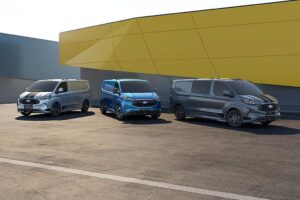Despite declining sales volumes and court cases, Honda Australia stands firm on dealership agency model
Honda Australia director and auto division COO, Stephen Collins, has rated the brand’s first financial year under a new agency model as a pass, despite lower-than-forecast sales volumes and Federal Court action instigated by the Australian Competition and Consumer Commission (ACCC) last month.
Speaking with carsales at the recent launch of the HR-V, Collins would not be drawn on commentary around Honda’s lacklustre sales performance thus far in 2022.
“VFACTs is a measure right now of supply as opposed to demand,” he countered. “If I look at our bookings, our contracts with customers that we measure on a daily basis, if I look at them over the last few months we’re at 20,000 pace [for total sales in 2022].
“Our back orders have been building and we’re trying to get the logistics right, but we’re confident that our core traffic of customers, conversions and the actual writing of our contracts is what counts and it’s at that 20,000 pace.
“So I’m not at all worried about what VFACTs says, because it’s not a true measure.”
Covid challenges
Honda, along with Mercedes-Benz, switched its Australian operations to an agency” model with national drive-away pricing last year. While this removed uncertainty around retail pricing, Collins acknowledged that the process would not suit all customers.
“In terms of agency itself we set out to make the customer’s experience smoother, more transparent and easier, and I reckon we’re ticking all those boxes,” he said. “We knew from day one it wasn’t going to be for everybody, we know that there would be people who just want to deal and who want a base grade and a deal, and the reality is those people aren’t buying our cars and we’re okay with that.”
Collins revealed the challenges of launching a new sales model against the backdrop of COVID-19-induced lockdowns.
“Where we’ve landed on agency is pretty much where we thought we’d be. July-August-September was very tough during lockdown and we were launching the agency model from our living rooms and bedrooms.
“After that transition period, we started to get back to normal business and seeing dealers getting used to the transaction and the processes.”
Agency sales on track
With sales of 17,562 in 2021 an almost-40 per cent drop year on year, a target of 20,000 sales for this year on the surface appears reasonable.
However, a shallow product pool and microchip-induced stock shortages mean the brand is currently not on target to hit the figure.
Up to the end of April, it had sold a little over 5,100 new cars, which is 38.5 per cent fewer year on year.
Collins reiterated his belief that the brand was on track to achieve its goal.
“The short answer is we’re comfortable with where we are at,” he said. “The 20k pace we’re comfortable with, we have new product coming through the pipeline, we think we’re in good shape.”
Agency court case
While he would not comment on specifics of the court case currently confronting Honda Australia, Collins pointed out that 90 per cent of the dealer group have come across to the agency model since July 2021.
“Yes, we’re in dispute with two of them and that will play itself out, but the vast majority have come on the journey with us and we’re pleased that’s the case,” he said.
There are currently 90 Honda dealers – down from 105 before July 2021 – with Collins conforming that no other dealerships have handed in their agreement since the agency model took effect.
Collins denied that the agency model would cause rural and regional dealers issues.
“It’s more challenging for a rural and remote rural dealer, because there’s not enough lift in the service UIO [units of operation], and because you might have one salesperson selling five different brands, which is not as easy when you consider you’ve got dedicated product experts in metro areas,” he said. “
“Whether it be a rural or a metro customer, the seamless transparency doesn’t change.”
Situation normal
Collins admitted that the going had been far from easy.
“I’m not going to sit here and say it’s been all roses; it has had its challenges in some areas, but we expected that,” he said.
“When you fundamentally make such a big change from a process that’s been in place for 70 years, it’s not going to be easy-peasy.
“I know it’s easy to blame Covid, but we had Sydney and Melbourne in lockdown, launching a new business model and not one carryover [sale from the 2020/2021 financial year].
“We went through June and July starting from absolute scratch. The transition period was longer than what we thought it would be.
“But now we’re in a more normal situation, we’re more comfortable with where we’re at.”




